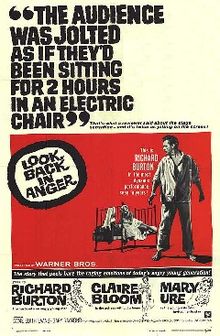
LOOK BACK IN ANGER
UK, 1959, 101 minutes, Black and white.
Richard Burton, Mary Ure, Claire Bloom, Edith Evans, Gary Raymond. Phyllis Neilson- Terry, Donald Pleasance, George Devine.
Directed by Tony Richardson.
Look Back In Anger is one of director Tony Richardson's early feature films. It marked the beginning of his screen collaboration with playwright John Osborne. They were later to make The Entertainer. Osborne was to write the screenplay of Richardson's Oscar-winning Tom Jones.
Look Back In Anger was a milestone in the theatre in the '50s, showing the angry young man of the Britain of the '50s and the play was a smack at the established drawing room comedy and melodrama of the English stage.
Osborne's character Jimmy Porter was expressing resentment and anger against the society in which he lived - at times it seemed to lack direction but was nonetheless real. Richard Burton, seen in retrospect rather strangely, gives a vital performance as Jimmy Porter. He is matched by the two women in his life played by Claire Bloom and Mary Ure.
There is a very fine and touching performance by Edith Evans. Crisp black and white photography, jazz score and the aggressiveness make it a film of quite some impact although it now seems in many ways dated.
1. The importance of this film in the '50s? The play on which it was based? The impact of John Osborne and his attitudes? Tony Richardson and his film versions of Osborne? Why the impact in the '50s? Content., style? The impact in the '50s? Content. style? The impact now? The relevance of the attitudes, the anger and the critique?
2. Black and white photography? Editing styles, superimpositions etc.? The contribution of the musical score, jazz background?
3. The structure of the film: was it evident that it was based on a play? The opening out of the stage to exteriors, various rooms etc.? The importance of the speeches and their length, dramatic impact? The delivery by the stars, especially Richard Burton? The theatricality of the action. tableau, interactions? The anger and moods of the dialogue? The focus on Jimmy Porter, the patterns of the two women around him, contrasting with each other?
4. The importance of anger? The feelings of anger, outlets., violence? The origins of anger? Suppression, release? The objects of anger in the film? Jimmy and his venting his anger? The significance of anger in the film? Anger and the British context of the '50s, the late '50s? The significance of Jimmy Porter looking back in anger ? at what, why?
5. Jimmy Porter as an impressive and imposing character? As a person, authentic? A real person within this story? As a symbol of Britain, a man of his age? His jazz, the echoes, his home? Relationship with Alison and ordinary life? The importance of Cliff? The ordinariness of the basic situation.. audiences identifying with it? Class structures, class position,, work? The presuppositions for work, recreation? The film's attention to daily life styles?
6. Themes of love and hate? Jimmy and his self-image., attitude towards himself? Self-appreciation, depreciation? Self-assertiveness? His love for others, hatred? Alison and his love for her, taking her for granted? The ordinariness of Alison and her being there e.g. the ironing, market etc.? The contrast with his attitude towards Ma Tanner? His love, games?
7. The film's portrait of Alison - in herself, snobbery, race, the child, attitude towards Ma. Helena? The theatre, decisions? Cliff? The hostility towards Helena? The father? The open door? What developed ? and Alison's future?
8. The contrast with Helena and her appearance.. presence? Her arrival, taking sides, the humiliation? Trumpet, church. the table, her having to go? Consequent violence? Love for Jimmy, sharing with him? The theatre? The possibilities of an affair? How did Helena contrast with Alison as a woman, feminine attitudes., manner? The contrast of their approaches to Jimmy?
9. Richard Burton's style as Jimmy? Anger, self-image, work, friends, taken for granted attitude towards life? Criticism of society? The number of clashes? Relationship with Alison, hostility, pleading? The impact of the presence of Helena? How did each woman change him? Happy sequences e.g. the cinema, the market, at home? The spoken and unspoken anger? The rage of Jimmy - at what? The 20th century rage?
10. The portrait of Ma? Her influence on each of the characters, the significance of her death, the funeral and its timing?
11. Cliff ? as a person, well-delineated character, type? As a catalyst for action and decisions? His going to the station?
12. Helena's going and the farewell? Prospects for the future?
13. A portrait of three strong characters immersed in their environment, their times? As illustrating facets of human nature in its basics - anger, love and hate?
14. How authentic the atmosphere of the film, its insights into individuals and society? "Kitchen sink films showing society warts and all"? Human needs, communication, love and hate, humiliations, the potential for success?